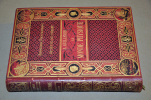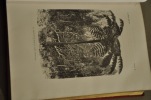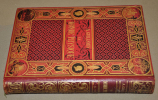GUILLEMIN Amédée
LE MONDE PHYSIQUE
volumes in 4 . à Paris librairie Hachette et Cie . 1884 , TOME 4 : LA CHALEUR. contenant 9 grandes planches tirées à part dont 1 en couleur et 324 vignettes inséraes dans le texte . 772 pages. superbe edition reliure editeur richement décorée. demi veau rouge plats pleine percaline editeur rouge , noire et or , dos et plats très ornés , dos à nerfs orné de caissons dorés , , trois tranches dorées.Tres bel objet pârfait etat , photos sur demande ,( attention il existe plusieurs version de la reliure )
Reference : 4920
RAY armo B5
Bookseller's contact details
Antiquités Duvert Martial
Martial Duvert
Place du Champs de Mars
26400 Crest
France
06 12 23 97 16
Payment mode
Sale conditions
Les prix indiqués sont nets et en euros, frais de port en supplément. Commande: Vous pouvez commander par lettre, e-mail, ou téléphone, en précisant la référence, l'auteur et le titre de chaque ouvrage. Nous vous confirmons la disponibilité des articles par retour d'e-mail (ou par téléphone), et nous vous calculons le montant des frais de port. Les commandes doivent être réglées sous dix jours. Mode d'expédition: Normal, suivi (pour la France) ou recommandé, selon votre choix (l'envoi en économique se fait aux risques et périls du client). Envoi dès la réception du règlement (livre\+ port). Mode de paiement: Les paiements doivent être effectués en euros. Nous acceptons les règlements par chèque bancaire français, virement, ou par mandat postal international (IMO). Située au centre de Crest, aux pieds de l’Escalier des Cordeliers, librairie est ouverte tous les jours, sauf dimanche, lundi et jours fériés, de 9h00 à 19h. Estimation gratuite en magasin. Expertise sur demande. Nous achetons de manière permanente livres anciens, livres d'occasion et gravures. Tous les livres et documents n'étant pas proposés sur les sites, nous envoyons sur demande des listes thématiques complètes. Nous restons à votre disposition pour tous renseignements complémentaire
5 book(s) with the same title
Le monde physique. V. LA METEOROLOGIE. LA PHYSIQUE MOLECULAIRE -- EDITION ORIGINALE -- TRES BEL EXEMPLAIRE RELIE EN PLEIN MAROQUIN BLEU MARINE, TETE DOREE
P., Hachette, 1885, un fort volume in 4 relié en PLEIN MAROQUIN BLEU MARINE, TÊTE DOREE (reliure de l'époque), (2), 1024pp., 31 PLANCHES dont 9 EN COULEURS, 343 figures dans le texte
---- EDITION ORIGINALE ---- TRES BEL EXEMPLAIRE ---- Forme et dimensions de la terre - Etendue et distribution des terres et des eaux - Le relief des continents - La profondeur des mers - Constitution physique et chimique de l'atmosphère - La pression atmosphérique - La température de l'air - La vapeur d'eau dans l'air - Les hydrométéores - Les glaciers - Températures du sol et des eaux - les volcans - Les tremblements de terre - Les courants marins - Les vents réguliers - les tempêtes - La prévision du temps - Les climats - La physique moléculaire**5517/P6DE
Le Monde Physique. En 5 TOMES
HACHETTE et Cie. 1881. In-4. Relié cuir dos-coins. Bon état, Couv. défraîchie, Dos satisfaisant, Quelques rousseurs. 872 + 668 + 1007 + 772 + 1024 pages. Nombreuses illustrations en noir et blanc, dans le texte et en hors-texte. Nombreuses planches illustrées en couleurs. Titre doré sur le dos cuir rouge, à 4 nerfs. Coins cuir rouge. Epidermures sur le cuir.. . . . Classification Dewey : 530-Physique
TOME 1 : La Pesanteur et la gravitation universelle - Le Son. TOME 2 : La Lumière. TOME 3 : Le Magnétisme et l'Electricité. TOME 4 : La Chaleur. TOME 5 : La Météorologie, la Physique Moléculaire. Classification Dewey : 530-Physique
Systeme de la Nature ou Des Loix du Monde Physique & du Monde Moral. 2 vols. - [""MAN IS OF ALL BEINGS THE MOST NECESSARY TO MAN""]
London, 1774. 8vo. 2 volumes uniformly bound in contemporary half calf with gilt ornamentation to spine. Spines with wear of boards miscoloured. Internally fine and clean. (16) 397 pp."" (4), 500, (3) pp. Wanting the frontispiece.
Later edition, published four years after the original, comprising ""The System of Nature"" - one of the most important works of natural philosophy ever written and the work that is considered the main work of materialism - and ""The Social System"", being d'Holbach's seminal ""social"" and political continuation of that groundbreaking work. D'Holbach (1723-1789), who was raised by a wealthy uncle, whom he inherited, together with his title of Baron, in 1753, maintained one of the most famous salons in Paris. This salon became the social and intellectual centre for the Encyclopédie, which was edited by Diderot and d'Alembert, whom he became closely connected with. D'Holbach himself also contributed decisively to the Encyclopédie, with at least 400 signed contributions, and probably as many unsigned, between 1752 and 1765. The ""Côterie holbachique"" or ""the café of Europe"", as the salon was known, attracted the most brilliant scientists, philosophers, writers and artists of the time (e.g. Diderot, d'Alembert, Helvetius, Voltaire, Hume, Sterne etc, etc.), and it became one of the most important gathering-places for the exchange of philosophical, scientific and political views under the ""ancient régime"". Apart from developing several foundational theories of seminal scientific and philosophical value, D'Holbach became known as one of the most skilled propagators and popularizers of scientific and philosophical ideas, promoting scientific progress and spreading philosophical ideas in a new and highly effective manner. As the theories of d'Holbach's two systematic works were at least as anticlerical and unaccepted as those of his smaller tracts, and on top of that so well presented and so convincing, it would have been dangerous for him to print any of them under his own name, and even under the name of the city or printer. Thus, ""Systême de la Nature"" appeared pseudonomously under the name of the secretary of the Académie Francaise, J.B. Mirabaud, who had died 10 years earlier, and under a fictive place of printing, namely London instead of Amsterdam. ""He could not publish safely under his own name, but had the ingenious idea of using the names of recently dead French authors. Thus, in 1770, his most famous book, ""The System of Nature"", appeared under the name Jean-Baptiste Mirabaud"" (PMM 215), and so the next ""System"" also appeared in the same manner three years later. D'Holbach was himself the most audacious philosophe of this circle. During the 1760's he caused numerous anticlerical tracts (written in large, but not entirely, by himself) to be clandestinely printed abroad and illegally circulated in France. His philosophical masterpiece, the ""Système de la nature, ou des lois du monde physique et du monde moral"", a methodological and intransigent affirmation of materialism and atheism, appeared anonymously in 1770"" (D.S.B. VI:468), as did the social and political follow-up of it, the famous ""Systême social"" in 1773. That is to say, Mirabeau whom he had used as the author on the ""System of Nature"" in 1770 is not mentioned in the ""Social System"", on the title-page of which is merely stated ""By the Author of ""Systême de la Nature"". In his main work, the monumental ""Système de la Nature"", d'Holbach presented that which was to become one of the most influential philosophical theories of the time, combined with and based on a complex of advanced scientific thought. He postulated materialism, and that on the basis of science and empiricism, on the basis of his elaborate picture of the universe as a self-created and self-creating entity that is constituted by material elements that each possess specific energies. He concludes, on the basis of empiricism and the positive truths that the science of his time had attained, that ideas such as God, immortality, creation etc. must be either contradictory or futile, and as such, his materialism naturally also propounded atheism"" his theory of the universe showed that nature is the product of matter (eternally in motion and arranged in accordance with mechanical laws), and that reality is nothing but nature. Thus, having in his ""Systême de la Nature"" presented philosophical materialism in an actual system for the first time and having created a work that dared unite the essence of all the essential material of the English and French Enlightenment and incorporate it into a closed materialistic system, d'Holbach had provided the modern world with a moral and ethic philosophy, the effects of which were tremendous. It is this materialism and atheism that he continues three years later in his next systematic work ""Systême social"", through which politics, morality, and sociology are also incorporated into his system and take the place of the Christianity that he had so fiercely attacked earlier on. In this great work he extends his ethical views to the state and continues the description of human interest from ""Systême de la Nature"" by developing a notion of the just state (by d'Holbach called ""ethocracy"") that is to secure general welfare. ""Système social (1773"" ""Social System"") placed morality and politics in a utilitarian framework wherein duty became prudent self-interest."" (Encyclopaedia Brittanica). ""Holbach's foundational view is that the most valuable thing a person seeking self-preservation can do is to unite with another person: ""Man is of all beings the most necessary to man"" (Sysème social, 76"" cf. Spinoza's Ethics IVP35C1, C2, and S). Society, when it is just, unites for the common purpose of preservation and the securing of welfare, and society contracts with government for this purpose."" (SEP). Both works had a sensational impact. For the first time, philosophical materialism is presented in an actual system, and with the second of them, this system also comprised politics and sociology, a fact which became essential to the influence and spreading of this atheistic scientific-philosophical strand. The effects of the works were tremendous, and the consequences of their success were immeasurable, thus, already in the years of publication, both works were confiscated. The ""Système de la Nature"" was condemned to burning by the Parisian parliament in the year of its publication"" the ""Système social"" was on the list of books to be confiscated already in 1773, and it was placed on the Index of the Church in August 1775. Both works are thus scarce. In spite of their condemnation, and in spite of the reluctance of contemporary writers to acknowledge the works as dangerous (as Goethe said in ""Dichtung und Wahrheit"": ""Wir begriffen nicht, wie ein solches Buch gefährlich sein könnte. Es kam uns so grau, so todtenhaft vor""), the ""Systems"" and d'Holbach's materialism continued its influence on philosophic, political and scientific thought. In fact, it was this materialism that for Marx became the social basis of communism. ""In the ""Système"" Holbach rejected the Cartesian mind-body dualism and attempted to explain all phenomena, physical and mental, in terms of matter in motion. He derived the moral and intellectual faculties from man's sensibility to impressions made by the external world, and saw human actions as entirely determined by pleasure and pain. He continued his direct attack on religion by attempting to show that it derived entirely from habit and custom. But the Systeme was not a negative or destructive book: Holbach rejected religion because he saw it as a wholly harmful influence, and he tried to supply a more desirable alternative. ""(Printing and the Mind of Man, 215). ""In keeping with such a naturalistic conception of tings, d'Holbach outlined an anticreationalist cosmology and a nondiluvian geology. He proposed a transformistic hypothesis regarding the origins of the animal species, including man, and described the successive changes, or new emergences, of organic beings as a function of ecology, that is, of the geological transformation of the earth itself and of its life-sustaining environment. While all this remained admittedly on the level of vague conjecture, the relative originality and long-term promise of such a hypothesis -which had previously been broached only by maillet, Maupertuis, and Diderot- were of genuine importance to the history of science. Furthermore, inasmuch as the principles of d'Holbach's mechanistic philosophy ruled out any fundamental distinction between living an nonliving aggregates of matter, his biology took basic issue with both the animism and the vitalism current among his contemporaries...This closely knit scheme of theories and hypotheses served not merely to liberate eighteenth-century science from various theological and metaphysical empediments, but it also anticipated several of the major directions in which more than one science was later to evolve. Notwithstanding suchprecursors as Hobbes, La Mttrie, and Diderot, d'Holbach was perhaps the first to argue unequivocally and uncompromisingly that the only philosophical attitude consistent with modern science must be at once naturalistic and antisupernatural."" (D.S.B. VI:469).
Système de la Nature, ou Des Loix du Monde Physique & du Monde Moral.
A Londres, 1777, 1 volume in-8 de 210x130x45 mm environ, 1f.blanc, xiv-616 pages, 1f.blanc, volume réemboîté dans une reliure postérieure en cuir brun, dos lisse orné de motifs dorés avec pièce de titre bordeaux, tranches dorées. Quelques rousseurs et pages brunies, des mouillures claires dans les marges, frottements et craquelures sur le cuir, coins et coiffes émoussés, déchirure p. 237 sans manque.
Paul-Henri Thiry, baron dHolbach, né Paul Heinrich Dietrich von Holbach, né à Edesheim, Rhénanie-Palatinat, le 8 décembre 1723 et mort à Paris le 21 janvier 1789, était un savant et philosophe matérialiste dorigine allemande et dexpression française. Seigneur de Heeze, Leende et Zesgehuchten (Brabant), il était propriétaire du château de Heeze. D'Holbach participe à lEncyclopédie de Diderot et dAlembert à partir de 1751 et rédige des articles traitant de métallurgie, géologie, medecine, de minéralogie et de chimie. Merci de nous contacter à l'avance si vous souhaitez consulter une référence au sein de notre librairie.
ENCYCLOPEDIE GEOGRAPHIQUE PERMANENTE - TOMES I ET II : LE MONDE ET SON VISAGE + LES ATLAS : GEOGRAPHIQUE ET HISTORIQUE : LE MONDE PHYSIQUE : les roches les terrains, les sols en France,etc / L'HOMME : Les races, religions, langues,etc
BORDAS. NON DATE. In-4. Relié. Bon état, Couv. convenable, Dos satisfaisant, Intérieur frais. 400 (Tome I) + 144 + environ 50 pages + 32 planches (Tome II).Tome I : Nombreuses photos, illustration et cartes en noir et blanc ou noir et bleu, dans et hors texte. Tome II : Nombreuses cartes en couleurs, dans et hors texte.2 rhodoïdes en bon état. Titres, tomaisons et éditeur dorés aux dos. Sous emboîtage cartonné et illustré en couleurs, en bon état. 3 PHOTOS DISPONIBLES.. . Sous Emboitage. . Classification Dewey : 900-GEOGRAPHIE, HISTOIRE, SCIENCES AUXILIAIRES DE L'HISTOIRE
SOMMAIRE / TOME I : LE MONDE PHYSIQUE : les roches les terrains, les sols en France,etc / L'HOMME : Les races, religions, langues,etc / LES ETATS ET TERRITOIRES / TOME II : ATLAS HISTORIQUE : Monde grec, romain - Europe carolingienne,etc - ATLAS GEOGRAPHIQUE : Europe,France, Asie,etc. Classification Dewey : 900-GEOGRAPHIE, HISTOIRE, SCIENCES AUXILIAIRES DE L'HISTOIRE
 Write to the booksellers
Write to the booksellers








